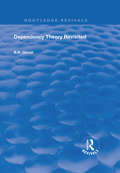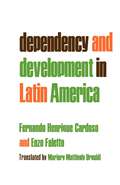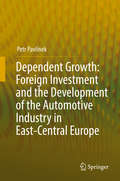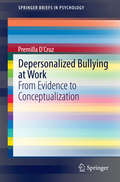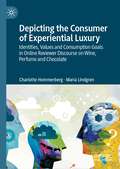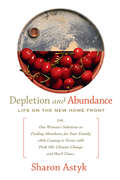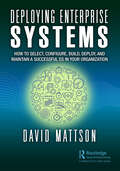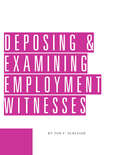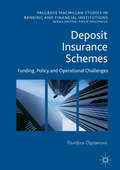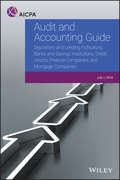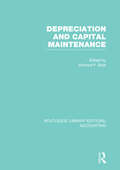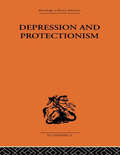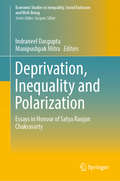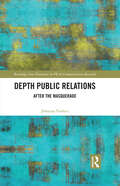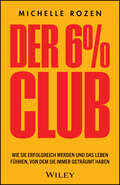- Table View
- List View
Dependency Theory Revisited (Routledge Revivals)
by B.N. GhoshThis title was first published in 2001. An important critical study of the theories of dependency both past and present. Since the theories of dependency are based on the Marxian notion of exploitation and backwardness, the book starts with the elaboration of the Marxian theory of development and underdevelopment. The book analyses various concepts and precepts of dependency as well as critically discussing the individual theories of Baran, Frank, Amin, Emmanuel, Prebisch and Singer. The contributions of more recent writers including Furtado, Kay, Wallerstein and Marini are also considered. The main focus of the book lies in the thorough analysis of all the important traditional as well as modern theories of dependency. The main message of the present book is that the phenomenology of dependency is still relevant as a methodology of study of development and underdevelopment. The book incorporates some pressing contemporary issues to give fresh flavour to the old dependency debate. A special feature of the book lies in the critical appraisal for each of the theories studied. The book is designed to serve as a valuable compendium for students of economic development and political economy and for those interested in the study of the economic backwardness of the Third World countries.
Dependency and Development in Latin America
by Fernando Henrique Cardoso Enzo FalettoAt the end of World War II, several Latin American countries seemed to be ready for industrialization and self-sustaining economic growth. Instead, they found that they had exchanged old forms of political and economic dependence for a new kind of dependency on the international capitalism of multinational corporations. In the much-acclaimed original Spanish edition (Dependencia y Desarrollo en América Latina) and now in the expanded and revised English version, Cardoso and Faletto offer a sophisticated analysis of the economic development of Latin America.The economic dependency of Latin America stems not merely from the domination of the world market over internal national and "enclave" economies, but also from the much more complex interact ion of economic drives, political structures, social movements, and historically conditioned alliances. While heeding the unique histories of individual nations, the authors discern four general stages in Latin America's economic development: the early outward expansion of newly independent nations, the political emergence of the middle sector, the formation of internal markets in response to population growth, and the new dependence on international markets. In a postscript for this edition, Cardoso and Faletto examine the political, social and economic changes of the past ten years in light of their original hypotheses.
Dependent Growth: Foreign Investment and the Development of the Automotive Industry in East-Central Europe
by Petr PavlínekThis book offers a critical analysis of recent developments in the automotive industry of East-Central Europe (ECE). Economists, industry specialists and national governments have considered the rapid development of the automotive industry in ECE in the past twenty years an unqualified success. This rapid growth has been based on large inflows of foreign direct investment (FDI) from Western Europe, North America, Japan and South Korea, and it significantly contributed to GDP growth, created thousands of new jobs, and completely transformed the previously existing automotive industry in the region. This volume offers an analysis that goes beyond uncritical celebratory accounts of this rapid growth. It is based on original, detailed firm-level research conducted by the author in Czechia and Slovakia between 2009 and 2015 that covered assembly firms and the networks of component suppliers. Theoretically and conceptually, the analysis will draw on the global production networks and global value chains perspectives. Drawing on the original empirical data and on additional available information, this volume concentrates on several important questions related to the development of the automotive industry in ECE in the 2000s:• The role of FDI in the rapid development of the automotive industry after 1990 and particularly in the 2000s.• The upgrading of the automotive industry in East-Central Europe through FDI• The position of ECE in the automotive industry research and development (R&D)• The effects of the 2008-2009 economic crisis in the automotive industry of ECE.• The role of state in the rapid development of the automotive industry in ECE in the 1990s and 2000s.• The effects of FDI on domestic firms in the form of linkages between foreign-owned and domestic firms and spillovers from foreign-owned to domestic firms.
Depersonalized Bullying at Work
by Premilla D'CruzThe book advances the nascent concept of depersonalized workplace bullying, highlighting its distinctive features, proposing a theoretical framework and making recommendations for intervention. Furthering insights into depersonalized bullying at work is critical due to the anticipated increased incidence of the phenomenon in the light of the competitive contemporary business economy, which complicates organizational survival. Drawing on two hermeneutic phenomenological inquiries set in India focusing on targets and bullies, the book evidences that depersonalized bullying is a sociostructural entity that resides in an organization's structural, processual and contextual design. Enacted by supervisors and managers through the engagement of abusive and aggressive behaviours, depersonalized bullying is resorted to in the pursuit of competitive advantage as organizations seek to ensure their continuity and success. Given the instrumentalism associated with the world of work, targets and bullies encountering depersonalized bullying display largely ambivalent responses to their predicament. Ironically, then, organizations' gains in terms of effectiveness are offset by the strains experienced by these protagonists. The theoretical generalizability of the findings reported in the book facilitates the development of an integrated framework of depersonalized workplace bullying, laying the foundations for forthcoming empirical and measurement endeavours that progress the concept. The book recognizes that whereas primary level interventions mandate repositioning the extra-organizational environment and/or recasting organizational goals to balance business and employee interests, secondary level and tertiary level interventions encompass various types of formal and informal social support to address targets' and bullies' interface with depersonalized bullying at work.
Depicting the Consumer of Experiential Luxury: Identities, Values and Consumption Goals in Online Reviewer Discourse on Wine, Perfume and Chocolate
by Charlotte Hommerberg Maria LindgrenThis book sheds light on the addressees of online reviewer discourse on wine, perfume and chocolate in order to explore how the discourse construes the consumer of experiential luxury. In the 21st century, luxury is more complex than ever before. Luxury products have become more affordable and hence accessible to new markets and consumer segments, and the groups of consumers seeking luxury experiences are more heterogeneous than ever. Yet, consumption choices as well as how these are thought about, evaluated and talked about still function to position consumers with respect to both how they see themselves and how they want others to see them. Many consumers seek to consume in subtle and sophisticated ways. They strive to develop consumption expertise with a view to maximizing their enjoyment from the luxury experience, avoiding overt displays of wealth while signalling status by means of luxury insight only available to the cognoscenti. One way for aficionados to develop their insight into the diversified and elusive realm of contemporary luxury is to engage with online reviewer discourse. The authors take a discourse analytic approach informed by the Appraisal model to expose the imagined addressees’ characteristics and behaviour, the luxury values they embrace and the goals of their luxury consumption. The authors argue that the activity of online reviewers is such a crucial arena in contemporary luxury that a new form of luxury consumption has emerged, which they label review-based luxury. This book will be of interest to students and academics in the fields of Linguistics, Discourse Analysis, Communication, Argumentation, Media Studies and Marketing, as well as anyone with a general interest in wine, perfume and chocolate as experiential luxury.
Depletion and Abundance
by Sharon AstykWhy are so few peak oil authors women? There's been much debate about this, and no one has yet arrived at a definitive answer. But whatever the reason, Sharon Astyk has established herself as a true rarity within the peak oil community by virtue of being a woman who has chosen to write about peak oil. The perspective she offers is thus both uncommon and vital.In Depletion and Abundance, she shows how rewarding life on her New Home Front could be, immeasureably improving our health, nutrition, sense of community and overall well-being. Chief among its benefits would be all the extra time that we'd have. She points out that people in medieval times worked far fewer hours than Americans do today, and that most people in modern-day peasant societies also work less hard than we do.This, along with Astyk's unique perspective as a woman, a mother and a peak oil activist, makes Depleiton and Abundance well worth a read. The ring of authenticity to her writing will hook you - while its relaxed style, ineffable humor, personal anecdotes and comforting touch will soothe your melancholy peaknik soul like a warm hand on the shoulder.Reviewed by Frank Kaminski, Energy BulletinSharon's introduction is pricelss in its succinct, dead-on analysis of collapse, and is reason enough to buy and send this book to everyone you know who is partially or completely clueless about where we're headed. "When I realized that everything was going to change, I was at first afraid. Because I thought, if my government or public policy or other choices weren't going to fix everything, what could I possibly do? What hope was there, if I had to take care of myself, if my community had to take care of itself?But when I began looking for solutions that could be applied on the level of ordinary human lives, that involved changes in perspectives and pulling together, the reclamation of abandoned ideas and the restoration of strong communitites, I began to feel hopeful, even excited. Because I realized that when large institutions cease to be powerful, sometimes that means that people start being powerful again."Depletion and Abundance is not a feel-good book, but it is intensely human, compassionate, supportive, pracitcal, alarming, enlivening, and astonishingly accurate.Reviewed by Carolyn Baker, Carolynbaker.netClimate change, peak oil, and economic instability aren't just future social problems-they jeopardize our homes and families right now.Our once-abundant food supply is being threatened by toxic chemical agriculture, rising food prices and crop shortages brought on by climate change. Funding for education and health care is strained to the limit, and safe and affordable housing is disappearing.Depletion and Abundance explains how we are living beyond our means with or without a peak oil/climate change crisis and that, either way, we must learn to place our families and local communities at the center of our thinking once again. The author presents strategies to create stronger homes, better health and a richer family life and to:*live comfortably with an uncertain energy supply *prepare children for a hotter, lower energy, less secure world *survive and thrive in an economy in crisis, and *maintain a kitchen garden to supply basic food needs.Most importantly, readers will discover that depletion can lead to abundance, and the anxiety of these uncertain times can be turned into a gift of hope and action.An unusual family perspective on the topic, this book will appeal to all those interested in securing a future for their children and grandchildren.
Deploying Enterprise Systems: How to Select, Configure, Build, Deploy, and Maintain a Successful ES in Your Organization
by David MattsonThis book focuses on topics that business managers and project teams in global enterprises need to understand and follow to successfully deploy an Enterprise System (ES) for their organization. It explains: Why this type of software product will appeal to global organizations with the promise to replace their older individual systems with a single integrated ES and how an ES allows companies to integrate their unique operations with a single system of many integrated modules that are designed to provide prebuilt and tested applications; New concepts, steps, risks, and methods that an organization should follow to successfully create and deploy an ES; and the top 10 reasons that ES projects fail and the practices to manage these risks. In addition, the book describes a new Implementation Model and methods to ensure success in deploying an ES across a firm with several divisions, international operations, product lines, and infrastructure. Essentially, this book: Describes, in non-technical terms, what business functions this new software product will improve Shows how an enterprise should use this software product to accomplish their goals to install and use this new technology to upgrade their older systems Explains what an organization’s management and project teams should avoid during selecting, planning, and implementing their ES to avoid common mistakes Describes the skills and experience (including IT and general management) the Project Manager must have to lead the project team(s) to implement this advanced system.
Deployment Experiences of Guard and Reserve Families: Implications for Support and Retention
by Margaret C. Harrell Danielle M. Varda Megan K. Beckett Laura Werber Kimberly Curry HallUse of the Reserve Component has steadily increased since the 1990s, but little research has focused on how deployment affects guard and reserve families. This monograph presents the results of interviews with reserve component personnel and spouses, focusing on their deployment experiences and military career intentions. The authors conclude with suggestions on how the Department of Defense can better support guard and reserve families.
Depolarizing Food and Agriculture: An Economic Approach (Earthscan Food and Agriculture)
by Paul W. Barkley Andrew BarkleyMany issues in food and agriculture are portrayed as increasingly polarized. These include industrial vs. sustainable agriculture, conventional vs. organic production methods, and global vs. local food sourcing, to name only three. This book addresses the origins, validity, consequences, and potential resolution of these and other divergences. Political and legal actions have resulted in significant monetary and psycho-social costs for groups on both sides of these divides. Rhetoric on many issues has caused misinformation and confusion among consumers, who are unsure about the impact of their food choices on nutrition, health, the environment, animal welfare, and hunger. In some cases distrust has intensified to embitterment on both sides of many issues, and even to violence. The book uses economic principles to help readers better understand the divisiveness that prevails in the agricultural production, food processing and food retailing industries. The authors propose solutions to promote resolution and depolarization between advocates with seemingly irreconcilable differences. A multifaceted, diverse, but targeted approach to food production and consumption is suggested to promote social well-being, and reduce or eliminate misinformation, anxiety, transaction costs and hunger.
Depoliticising Humanitarian Action: Paradigms, Dilemmas, Resistance (Routledge Humanitarian Studies)
by Ayesha Siddiqi Isabelle Desportes Alice CorbetIs it ever possible to separate humanitarian action from politics? Drawing on the experience of both practitioners and researchers, this book is an essential guide to the thorny interplay between what are too often considered as separate worlds.The humanitarian sector aims to separate its work from politics, arguing that independence and neutrality are essential in order to gain entry into disaster and conflict settings. Yet, humanitarian claims of non-involvement in politics have also been dismissed as misleading, naive, or counter-productive. In practice, humanitarians find themselves working within political settings on a daily basis. This book investigates the theory behind depoliticisation, the political background and context behind humanitarian action, and the daily dilemmas faced by practitioners walking that fine line between principles and pragmatism. Finally, this book considers the importance of decolonising mainstream understandings of humanitarianism and politics, and of placing understandings from the Global South at the heart of the discussion.Balancing theoretical insights with empirical grounding, field examples, and recommendations for policy and practice, this book is perfect for researchers and students in humanitarian studies, political science, international relations, human rights, development studies, disaster studies, and peace and conflict studies, as well as humanitarian practitioners and policy makers.
Deposing & Examining Employment Witnesses
by Tod F. SchleierTo make it easy for you to prepare for a particular deposition or examination, the book is organized by witness. Each witness-specific section delivers: (1) trial-tested strategies and arguments, (2) model deposition questions specific to cause of action and annotated with tactics, (3) checklists and tactics for direct and cross examinations, with extensive examples sprinkled with practice tips, and (4) summary checklists of the important points that should be inquired into for each cause of action. Tools and advice are provided for both employee and management attorneys. Mastering the art of questioning employment witnesses is a career-long process. It can take dozens of years in the courtroom to learn how to persuasively: (1) demonstrate that reasonable economists can disagree, (2) compel an adverse witness to ratify your position, and (3) contradict a manager or plaintiff on an important fact. Tod Schleier's Deposing & Examining Employment Witnesses will take years off your learning curve. It is filled with practical strategies, examples, tactics, and tips for successful questioning and other essential elements of employment advocacy:
Deposit Guarantee Schemes: A European Perspective
by Francesca ArnaboldiArnaboldi highlights the importance of one of the three pillars of the Banking Union, the common mechanism for insuring deposits. She claims that integrated financial markets require a European solution with regard to deposit insurance and that the establishment of a pan-European scheme could address the problems for large cross-border banks.
Deposit Insurance Schemes
by Djurdjica OgnjenovicThis book provides a comprehensive overview of funding arrangements for explicit deposit insurance schemes. Responding to international guidelines and best practice, it discusses policy decisions and operational challenges which deposit insurers face in the financial management of ex-ante deposit insurance funds. Numerous examples are provided, and solutions offered on sources and uses of funds, focusing on target and optimal funding. Coverage includes: the role that modern deposit insurance schemes play in ensuring financial stability how to design the main deposit insurance features in order to maximize compliance with international standards the different types of funding and financial planning for deposit insurance methods for setting the target fund size level optimal deposit insurance funding challenges faced by the European Union members following new deposit insurance and bank resolution directives. The book concludes by providing a comprehensive overview of funding issues and recommendations for deposit insurance schemes in the European Union.
Deposit Insurance in China: Lessons from the US and UK Experience
by Ningyao YeThis book examines and compares the rationale, design, and implementation of deposit insurance in the US, the UK, and China, with the aim of finding an effective solution for China's nascent deposit insurance scheme by learning from the US and UK models.Deposit insurance, a pillar of the financial safety net that protects insured deposits and serves as a guarantee against losses on insured accounts, has become increasingly important in bank resolution. Using a comparative and interdisciplinary approach, this book examines the legal and regulatory issues surrounding deposit insurance schemes in three jurisdictions – the US, the UK, and China. It offers a timely analysis of the operating mechanisms and implications of deposit insurance during the global financial crisis. It also provides an in-depth doctrinal analysis of the US, the UK, and China's deposit insurance laws. Based on these discussions, the author proposes suggestions for reforming China's deposit insurance system and practice.The title will appeal to scholars and students of banking and banking law as well as legal and financial practitioners in the fields of commercial law and banking and financial regulation.
Depository and Lending Institutions- Banks and Savings Institutions, Credit Unions, Finance Companies, and Mortgage Compani: Banks And Savings Institutions, Credit Unions, Finance Companies, And Mortgage Companies (AICPA Audit and Accounting Guide)
by AicpaThe 2018 edition of this financial institution industry standard resource offers clear and practical guidance of audit and accounting issues such as transfers and servicing, troubled debt restructurings, financing receivables and the allowance for loan losses, and fair value accounting. It also provides direction for institutions assessing their operations and internal controls for regulatory considerations as well as discussions on existing regulatory reporting matters.
Depreciation and Capital Maintenance (Routledge Library Editions: Accounting)
by Richard P. BriefOf the nine articles reprinted in this volume originally published in 1984, those by Ladelle, Hotelling and Anton are recognized as being the classic articles on the depreciation of a single ‘machine’. Each of these articles was published in a journal that is often not accessible and reprinted here has brought them together in one place. For many years accountants have dealt with depreciation and capital maintenance as a static problem. This volume recognizes its dynamic aspects.
Depreciation at Delta Air Lines and Singapore Airlines (A)
by William J. Bruns Jr. Jeremy CottDepreciation policies at Delta Air Lines and Singapore Airlines are compared and contrasted against a summary of operating data from each airline. Questions focus attention on differing depreciation policies.
Depreciation at Delta Air Lines and Singapore Airlines (B)
by William J. Bruns Jr. Jeremy CottSupplements the (A) case.
Depreciation at Delta Air Lines: The 'Fresh Start'
by William J. Bruns Jr.In estimating depreciation for accounting purposes, Delta Air Lines has changed its assumptions about aircraft lifespan and residual values four times in the last thirty years or so. In the most recent changes, Delta adopted fair value accounting as part of its "fresh start" emergence from bankruptcy. Each of these policy changes has affected future asset values as well as present and future income. Students should organize their case analysis around three types of questions: (1) the estimated life cycle of commercial passenger airplanes; (2) the uses of financial reports, including the purpose of depreciation in reporting on assets and periodic income; and (3) alternative procedures for reporting asset book values and income that might better serve users of financial reports.
Depression & Protectionism: Britain Between the Wars
by Forrest CapieDepression and Protectionism considers the case of the oldest advocate of free trade and its greatest exponent, Britain, and examines the developments that led to the reversal of that policy in the 1930s. It also discusses the consequences of the protectionst policy for the domestic economy. * Discusses the most important debate in international economics* Using an explicit economic framework, the book examines the economic origins of the industrial tariff in Britain.
Depression Obsession: How the Great Depression Informs Bernanke's Thinking
by Ethan S. HarrisModern central banking is defined by two big policy mistakes of the last century: the Great Depression of the 1930s and the Great Inflation of the 1970s. Ben Bernanke's academic research has focused heavily on the Great Depression, which clearly informs his current policy outlook and his crusade against deflation.
Deprivation, Inequality and Polarization: Essays in Honour of Satya Ranjan Chakravarty (Economic Studies in Inequality, Social Exclusion and Well-Being)
by Indraneel Dasgupta Manipushpak MitraThis book offers a collection of original, state-of-the-art essays addressing various aspects of the economic analysis of inequality, deprivation, poverty measurement and social polarization, at both the theoretical and empirical level. Written by leading authorities in the fields of distributional analysis and normative economics, the respective chapters present detailed overviews of cutting-edge literature, as well as stand-alone research. Compiled as a tribute to Satya Ranjan Chakravarty’s lifetime contributions in the fields of normative economics and distributional analysis, it represents an indispensable resource for researchers, policymakers and doctoral students working on issues pertaining to income/wealth distribution, social inclusion and poverty reduction.
Depth Public Relations: After the Masquerade (Routledge New Directions in PR & Communication Research)
by Johanna FawkesContemporary global culture, rooted in neoliberalism and free market forces, increasingly emphasises appearance over substance. People and organisations are judged by image and reputation while social media encourages and enables us to develop our own public persona. Communication is increasingly about performance, contributing to a culture of smoke and mirrors. This book explores the role of public relations (PR) in promotional culture and extends this to include public relations as performance. Public and private bodies, including universities, have to perform their roles to secure social approval and economic survival. The PR field has benefitted from this emphasis on appearances. This book asks: at what cost? Has PR played a pivotal part in the creation of what Fawkes calls a ‘masquerade’. The first half of the book explores the darker aspects of promotional culture; the second half suggests taking a depth approach to find new foundations for public relations theory and practice. Carl Jung’s ideas about shadow, persona and integration offer pathways for new approaches. A key chapter explores the role of PR in the climate crisis and asks what PR can learn from those contemplating societal collapse. The book concludes with emerging principles of depth public relations and suggestions for future research. Depth Public Relations has implications for public relations, communication and cultural scholars, as well as those researching professions, identity and the challenges of the climate crisis.
Der 6% Club: Wie Sie erfolgreich werden und das Leben führen, von dem Sie immer geträumt haben
by Michelle RozenLernen Sie die Schritte zum Aufbau besserer Gewohnheiten und reihen Sie sich in die Riege der 6% der Veränderer und Zielerreicher ein! In "Der 6% Club" zeigt Dr. Michelle Rozen, The Change Doctor, den Lesern, wie sie neue positive Gewohnheiten entwickeln und beibehalten können, um die geheime Formel für das Leben, den Erfolg und das Glück zu finden, von dem sie immer geträumt haben. Das Buch entstand aus den Erkenntnissen einer durch die Autorin durchgeführten Studie, bei der Menschen befragt wurden, wie viel von ihren Neujahrsvorsätzen übriggeblieben ist nach einem Monat. Schockierender Weise ließen 94 % der Menschen, die sich vorgenommen hatten, etwas in ihrem Leben zu ändern - mehr Sport zu treiben, sich gesünder zu ernähren, mehr Geld zu sparen oder sich beruflich, privat oder in der Familie zu verbessern - das Gelöbnis bis Februar schon wieder fallen. Das Buch vermittelt die geheime Erfolgsformel der 6%, die es geschafft haben, dranzubleiben und ihre Vorsätze umzusetzen. Dr. Rozens kraftvolle, inspirierende und umsetzbare Methoden wurden über ein Jahrzehnt lang getestet. In diesem Buch lernen die Leser, wie sie: - mehr trainieren, gesünder essen, mehr Geld sparen, besser im Geschäft sein oder jedes andere persönliche oder berufliche Ziel erreichen können; - Veränderungen allein oder mit einer anderen Person, wie einem Freund oder Partner, schaffen; - mühelos aufhören, sich zu entschuldigen, aufzugeben oder etwas aufzuschieben.
Der Anti-Stress-Trainer für Assistenzen
by Peter Buchenau Marit ZenkDieses Buch aus der Anti-Stress-Trainer Reihe ist die Erlösung für gestresste Assistenzen, die im Drehkreuz Sekretariat mit zig Bällen jonglieren. Spüren Sie den Druck, dem Sie unterliegen? Sei perfekt, sei stark, sei nett, sei schnell oder streng dich an - welcher Antreiber steckt in Ihnen? Zu Zeiten von 4.0 braucht selbst die modernste und versierteste Assistenz eine gute Strategie, um in der digital-verrückten Welt zu bestehen. Und zwar gesund! Lassen Sie sich Ihrer Illusionen „Jemals fertig zu werden“ und „Alles muss perfekt sein“ berauben. Neben dem erklärten Dilemma der Assistenz gibt es viele wertvolle Tipps zum Umgang mit Stress. Gepaart mit amüsanten Bildern, Sprüchen und Weisheiten bringt die Autorin Sie sicher zum Schmunzeln! Lassen Sie sich von Marit Zenk mit auf die Reise in Ihre Welt nehmen.
